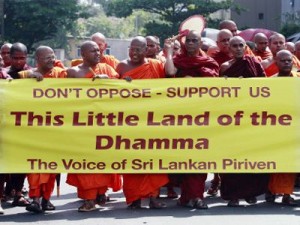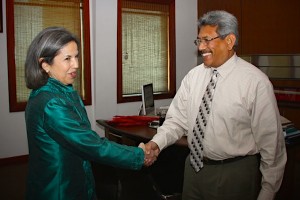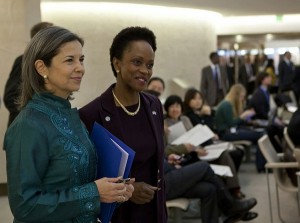A snake may lurk in the UN grass
‘A snake lurks in the grass’ - Virgil, Aenid
US backed resolution
It was reported in the media that the US backed draft resolution presented to the UNHRC inter alia :

(Sri Lankan Buddhist monks march towards the US embassy after handing over a petition during a protest amid ongoing discussion at UNHRC sessions in Geneva on Sri Lanka's war crimes, in Colombo March 14, 2012
1. Calls on the Government of Sri Lanka to implement the constructive recommendations in the LLRC report and additionally to take immediate steps to fulfill its relevant legal obligations and stated commitment to address serious allegations of violations of international law by initiating credible and independent investigations and prosecutions of those responsible for such violations,
2. Requests that the Government of Sri Lanka present a comprehensive action plan before the 20th session of the Human Rights Council detailing the steps the Government has taken and will take to implement the LLRC recommendations and also to address alleged violations of international law,
3. Encourages the Office of the High Commissioner for Human Rights and relevant special mandate holders to provide, and the Government of Sri Lanka to accept, advice and technical assistance on implementing those steps.’
Agreed to implement the demands of the Resolution
The United National Party (UNP) said that the government has adhered to the demands of the United Nations Human Rights Council (UNHRC) and the United States . UNP General Secretary Tissa Attanayake said that Minister Mahinda Samarasinghe in his speech at the UNHRC sessions in Geneva had agreed to implement the demands being made by the US . He explained that the Sri Lankan government has agreed to implement the recommendations of the Lessons Learnt and Reconciliation Commission (LLRC) as pointed out in the US draft resolution. According to Attanayake, the government could have avoided all these issues had it implemented the recommendations of the LLRC.
Assurances galore
In his speech Minister Samarasinghe explained to the Council that the government had already implemented some of these measures recommended by the LLRC including the resettlement of IDPs, de-mining, rehabilitation of ex-combatants, implementation of the language policy, recruitment of Tamil police officers and gradually removing the military from the civil administration in the North. The government will continue to address the

Maria Otero, US Under Secretary, Civilian Security, Democracy and Human Rights meets Gotabaya Rajapaksa, Secretary of Defence in February 2012
recommended measures comprehensively in a “systematic and thorough” manner, the Minister has assured. The Minister has assured to keep the Council informed of Sri Lanka ‘s progress on these issues in the sessions in June, September and in the course of the upcoming Universal Periodic Review (UPR) in October.
The powers of the Council
It is to be noted here that the Human Rights Council is an inter-governmental body within the United Nations system responsible for strengthening the promotion and protection of human rights around the globe and for addressing situations of human rights violations and make recommendations on them. It has the ability to discuss all thematic human rights issues and situations that require its attention throughout the year. It meets at the UN Office at Geneva . The Council is made up of 47 United Nations Member States which are elected by the UN General Assembly. The Human Rights Council replaced the former United Nations Commission on Human Rights. The Council was created by the United Nations General Assembly on 15 March 2006 by resolution 60/251. Its first session took place from 19 to 30 June 2006. One year later, the Council adopted its “Institution Building Package to guide its work and set up its procedures and mechanisms.
Functions
Among them was the Universal Periodic Review mechanism which serves to assess the human rights situations in all United Nations Member States, the Advisory Committee which serves as the Council’s “think tank” providing it with expertise and advice on thematic human rights issues and the Complaints Procedure, which allows individuals and organizations to bring human rights violations to the attention of the Council. The Human

Under Secretary for Civilian Security, Democracy, and Human Rights Maria Otero, and Assistant Secretary for International Organization Affairs Esther Brimmer, at the 19th Session of the Human Rights Council, March 2, 2012, Geneva, Switzerland.
Rights Council also works with the UN Special Procedures established by the former Commission on Human Rights and now assumed by the Council. These are made up of special rapporteurs, special representatives, independent experts and working groups that monitor, examine, advice and publicly report on thematic issues or human rights situations in specific countries. When creating the Human Rights Council in March 2006 the United Nations General Assembly decided that the Council’s work and functioning should be reviewed five years after it had come into existence at the level of the General Assembly.
The new Complaint Procedure is established in compliance with the mandate entrusted to the Human Rights Council by General Assembly resolution 60/251 of 15 March 2006, in which the Council was requested to review and, where necessary, improve and rationalize, within one year after the holding of its first session, all mandates, mechanisms, functions and responsibilities of the former Commission on Human Rights, including the 1503 procedure, in order to maintain a system of special procedures, expert advice and a complaint procedure.
Accordingly, ECOSOC resolution 1503 (XLVIII) of 27 May 1970 as revised by resolution 2000/3 of 19 June 2000, served as a working basis for the establishment of a new Complaint Procedure and was improved where necessary to ensure that the complaint procedure be impartial, objective, efficient, victims-oriented and conducted in a timely manner.
In compliance with the mandate entrusted to it by the General Assembly, the Council decided on 30 June 2006 to establish the Working Group on the implementation of operative paragraph 6 of General Assembly resolution 60/251 (decision 1/104), to formulate concrete recommendations on the issue of reviewing and when necessary, improving and rationalizing all mandates, mechanisms, functions and responsibilities of the former Commission on Human Rights, including the 1503 procedure.
Complaints
Pursuant to Council resolution 5/1, the Complaint Procedure is being established to address consistent patterns of gross and reliably attested violations of all human rights and all fundamental freedoms occurring in any part of the world and under any circumstances. It retains its confidential nature, with a view to enhancing cooperation with the State concerned. The procedure, inter alia, is to be victims-oriented and conducted in a timely manner. Two distinct working groups – the Working Group on Communications and the Working Group on Situations – are established with the mandate to examine the communications and to bring to the attention of the Council consistent patterns of gross and reliably attested violations of human rights and fundamental freedoms.
What is admissible
The Working Group on Situations (WGS) comprises five members appointed by the regional groups from among the States member of the Council for the period of one year (mandate renewable once). It meets twice a year for a period of five working days in order to examine the communications transferred to it by the Working Group on Communications, including the replies of States thereon, as well as the situations which the Council is already seized of under the complaint procedure. The Working Group on Situations, on the basis of the information and recommendations provided by the Working Group on Communications, presents the Council with a report on consistent patterns of gross and reliably attested violations of human rights and fundamental freedoms and makes recommendations to the Council on the course of action to take. Subsequently, it is the turn of the Council to take a decision concerning each situation thus brought to its attention. A communication related to a violation of human rights and fundamental freedoms is admissible, unless:
• It has manifestly political motivations and its object is not consistent with the UN Charter, the Universal Declaration of Human Rights and other applicable instruments in the field of human rights law; or
• It does not contain a factual description of the alleged violations, including the rights which are alleged to be violated; or
• Its language is abusive. However, such communication may be considered if it meets the other criteria for admissibility after deletion of the abusive language; or
• It is not submitted by a person or a group of persons claiming to be the victim of violations of human rights and fundamental freedoms or by any person or group of persons, including NGOs acting in good faith in accordance with the principles of human rights, not resorting to politically motivated stands contrary to the provisions of the UN Charter and claiming to have direct and reliable knowledge of those violations. Nonetheless, reliably attested communications shall not be inadmissible solely because the knowledge of the individual author is second hand, provided they are accompanied by clear evidence; or
• It is exclusively based on reports disseminated by mass media; or
• It refers to a case that appears to reveal a consistent pattern of gross and reliably attested violations of human rights already being dealt with by a special procedure, a treaty body or other United Nations or similar regional complaints procedure in the field of human rights; or
• The domestic remedies have not been exhausted, unless it appears that such remedies would be ineffective or unreasonably prolonged.
Be wary of snakes
Although it has been said that as Sri Lanka is not a signatory to the Rome Statute that the International Court of Justice has no jurisdiction over its territory Article 13(b) of the Rome Statue provides that the Court may exercise its jurisdiction in ‘A situation in which one or more of such crimes appears to have been committed is referred to the Prosecutor by the Security Council acting under Chapter VII of the Charter of the United Nations.’ The Statute in Article 17 referring to ‘Deferral of investigation or prosecution’ provides that ‘No investigation or prosecution may be commenced or proceeded with under this Statute for a period of 12 months after the Security Council, in a resolution adopted under Chapter VII of the Charter of the United Nations, has requested the Court to that effect; that request may be renewed by the Council under the same conditions.’ If the Human Rights Council makes a reccommendation to the Security Council on he US backed resolution it may refer such matter to the ICJ.
Sri Lanka should be vary of the motive behind the US backed resolution as it may be that as Virgil said a snake lurks in the grass.
The writer is an Attorney-at-law



